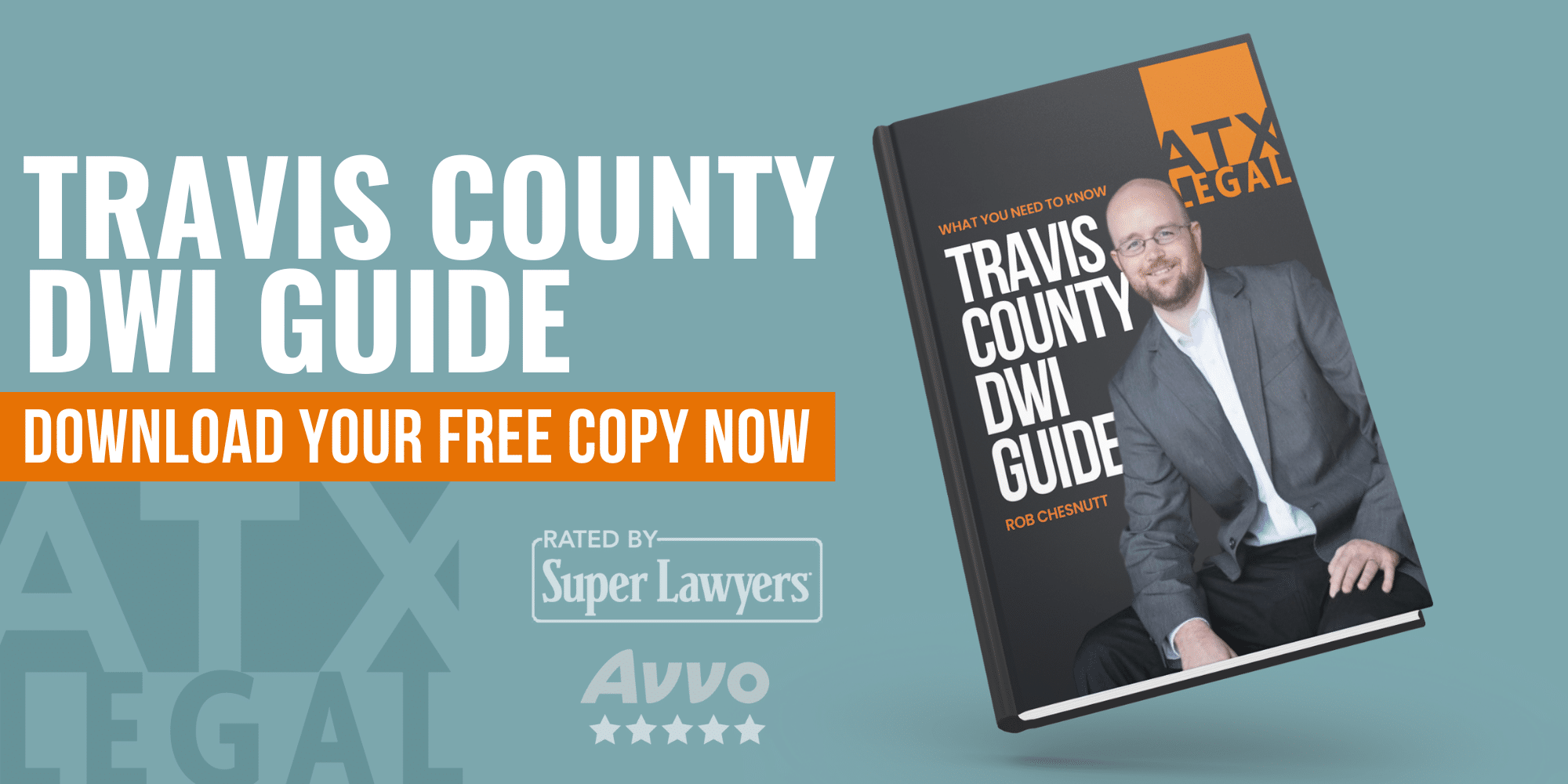Austin 2nd DWI Lawyer
Experienced Austin Second DWI Charge Attorney
Facing a 2nd DWI in Texas can feel overwhelming and stressful. Retaining experienced legal representation for your criminal charge is critical to understanding your rights, navigating the complex legal process, and potentially mitigating consequences.
As an experienced Austin DWI Attorney, I am dedicated to representing individuals facing their second offense DWI. On this page, we will delve into the nuances of second-time DWI charges in Texas, demystifying the legal terminology and procedures, and exploring potential defense strategies.
What is a Second-time DWI?
A second-time DWI (Driving While Intoxicated) charge in Texas refers to a situation where an individual is charged with driving under the influence of alcohol or drugs for the second time. This implies that the person has a prior conviction of a DWI offense.
However, it’s important to be aware that if an individual’s prior DWI charge was dismissed or reduced to a lesser charge, it does not count as a conviction for the purposes of a second-time DWI charge. In other words, a dismissed charge is not considered a ‘strike’ against you.
Therefore, even though you may have been charged twice, if the initial DWI charge was dismissed, the subsequent charge will legally be considered your first DWI charge.
2023 Travis County DWI Guide
What Are the Penalties for a Second DWI in Texas?
The penalties for a second DWI charge in Texas are more severe than a first-time DWI and are detailed under Texas Penal Code 49.04(c). If convicted, an individual may face a Class A misdemeanor charge, which carries potential penalties of up to a year in county jail, a fine of up to $4,000, or a combination of both. Apart from these direct penalties, the convicted individual might also be mandated to complete 80 to 200 hours of community service.
Moreover, a second DWI conviction can result in a license suspension period of up to 2 years and mandatory installation of an ignition interlock device (IID) in the offender’s vehicle. This device requires a breath sample before the engine will start. If the device detects alcohol on the breath, the engine will not start.
Please note that these penalties can be even more severe if the individual had a blood alcohol concentration (BAC) of 0.15% or higher at the time of the arrest. It’s crucial to consult with an experienced DWI attorney if you’re facing a second DWI charge in Texas, as the legal ramifications can significantly impact your life.
There is no time limit between a DWI 2nd charge and your previous DWI conviction.
A previous DWI conviction in Texas never falls off your criminal record, irrespective of the time elapsed since the conviction. This is a common misconception that many people have.
Even if there are thirty years or more between DWI offenses, the first DWI conviction will still count as a first conviction. The law does not consider the time gap between offenses, and any subsequent infraction will be treated as a repeat offense. The record of a DWI conviction will stick with you indefinitely.
What is the Long Term Impact of a 2nd DWI Conviction?
The long-term impact of a DWI second offense in Texas extends beyond the courtroom and can significantly affect various aspects of an individual’s life. A second DWI conviction can lead to employment difficulties, as certain jobs may not hire individuals with a criminal record. Current employers may also view such convictions negatively. If your job includes driving, your employer may be forced to fire you or place you in a different role to maintain their insurance.
Furthermore, auto insurance rates typically skyrocket after a DWI conviction. Additionally, if child custody or divorce proceedings are involved, a DWI conviction could influence judgments.
On an educational front, some colleges and universities may refuse admission or revoke scholarships based on criminal convictions. It’s impossible to know just how a second DWI will affect your life, underscoring the importance of a good criminal defense lawyer.
After a second DWI conviction, the next one is a Felony
In Texas, the law becomes harsher with each successive DWI offense. A third DWI offense is not simply another misdemeanor – it is considered a third-degree felony DWI. This change in classification signifies a substantial escalation in the severity of the legal consequences.
A felony conviction carries a penalty of 2 to 10 years in state prison. Additionally, fines can reach up to $10,000, not including the costs associated with license reinstatement, probation, mandatory alcohol education, and other potential penalties.
Furthermore, the social stigma attached to a felony conviction is much higher, often leading to increased difficulties in employment and personal relationships. Therefore, it is critically important to avoid a third DWI offense.
Can a Second Offense DWI be Dismissed in Texas?
A knowledgeable DWI attorney can employ a range of legal strategies to potentially get a second DWI dismissed in Texas.
- Challenging the traffic stop: If the attorney can prove that the police officer who conducted the traffic stop lacked a valid reason or probable cause, the case may be dismissed.
- Questioning the sobriety tests: Field sobriety tests are subjective and may not always be accurate. An attorney can challenge the validity of these tests by highlighting factors that may have influenced the results, such as medical conditions, weather, or even the individual’s footwear.
- Disputing blood or breath test results: These tests can also be prone to errors. An attorney can question the accuracy of the devices used, the manner in which the test was administered, or the qualifications of the person who administered the test.
- Examining the arrest procedure: If the arresting officer did not respect the defendant’s rights during the arrest, such as failing to read them their Miranda rights, the attorney may use this to get the case dismissed.
Remember, these are potential strategies and the success of your case will depend on its specific circumstances. It is always advisable to consult with a skilled DWI attorney to discuss your options.
How Can You Get a Second DWI Reduced?
There are several legal strategies that might be used to get a second DWI reduced in Texas.
- Reduction to a Class B Misdemeanor: The prosecutor will sometimes agree to reduce the charge to a class B misdemeanor, dropping the 2nd time DWI enhancement. This option comes with less severe penalties, typically a maximum of 180 days in jail and a fine not to exceed $2,000.
- Reduction to Obstructing a Roadway: In some cases, a lawyer might be able to negotiate a plea deal to reduce a second DWI to an “obstructing a roadway” charge. This offense is considered to be less severe than a DWI and won’t result in a driver’s license suspension. However, this is typically an option only if the prosecutor believes their case is weak, or if there are other extenuating circumstances.
- Reduction to a Class C Traffic Ticket: Short of dismissal, this is the least severe outcome and typically involves pleading to a lesser offense, such as a traffic violation. The penalties would include a fine of up to $500 and no jail time. However, achieving this reduction on a second time DWI is generally only possible if there are significant issues with the prosecution’s case.
It’s essential to note that these are potential strategies, and their success considerably depends on the specific details of your case. Therefore, consulting with a skilled DWI attorney who is familiar with the local courts and the specifics of Texas DWI laws is crucial to achieving the best possible outcome in a second DWI case.
What Factors Could Impact Your Ability to Get the Charges Reduced?
Several factors could impact the ability to reduce a DWI charge. These include:
- The Strength of the Prosecution’s Case: If the prosecution has strong evidence, such as a high blood alcohol content (BAC), reliable witness testimonies, or clear video footage, it may be more challenging to negotiate a lesser charge.
- Prior Charges: The court will consider past DWI offenses. Even dismissed or reduced charges could factor into the decision.
- Accidents or Injuries: If the DWI incident resulted in an accident, especially one causing property damage or injuries, it’s less likely that the charge will be reduced.
- The Presence of a Minor: If a minor was present in the vehicle at the time of the offense, this could lead to more severe (including felony) charges and make it harder to negotiate a reduction.
- Your Legal Representation: The skill and experience of your attorney also play a significant role. A knowledgeable attorney who understands local DWI laws and has good relationships with the local courts may be more successful in achieving a charge reduction.
- Demonstration of Sobriety: A defendant’s ability to demonstrate their sobriety can significantly impact their case. If they can show a commitment to sobriety through actions such as attending alcohol education classes or participating in substance abuse treatment programs, it may increase the chances of negotiation for a lesser charge.
It’s important to understand that these factors could vary case by case; therefore, a thorough legal consultation is strongly advised.
Probation for Second DWI in Texas
Probation is an alternative to jail that the court might consider for those convicted of a second DWI in Texas. As part of the probation, the defendant is expected to abide by certain conditions set forth by the court.
These might include regular check-ins with a probation officer, mandatory participation in alcohol education or substance abuse treatment programs, random drug and alcohol testing, and maintaining a clean criminal record. Additionally, community service, installation of an IID, or attending a MADD victim impact panel could be part of the probation terms.
Failure to meet these conditions could result in the probation being revoked and the defendant being sent to jail. The exact terms of probation can vary based on several factors, including the circumstances of the offense, the defendant’s past criminal history, and their demonstrated commitment to sobriety.
How does a 2nd DWI in Texas impact your driver’s license?
A second offense DWI in Texas carries severe implications for your driving record. According to Texas law, your driver’s license can be suspended for up to two years following a second DWI charge. During the period of suspension, it might be possible to apply for an occupational license that allows for limited driving, such as commuting to work or school.
It’s important to note that an IID may be required in your vehicle as a condition of obtaining an occupational license. The installation and maintenance costs of this device are borne by the defendant. The severity of driver’s license penalties can be influenced by factors such as the details of the offense and the defendant’s previous record.
Frequently Asked Questions
- What if my first DWI was outside of Texas?
- Will I need an Ignition Interlock Device?
- My first DWI was 30 years ago. Does it still count against me?
- Is jail time mandatory for a Second DWI offense in Texas?
Hire the right 2nd DWI defense attorney
Choosing the right DWI defense attorney can significantly impact the outcome of your case. The attorney should have a thorough understanding of DWI laws, rights, and penalties, and should be able to assess your case accurately to provide the best possible defense. Look for an attorney with a proven track record in handling DWI cases, as their experience and knowledge will be invaluable in navigating complex legal proceedings. Also, consider the attorney’s communication style and ensure they can explain the process clearly and keep you informed about your case’s progress. Investing in an experienced and knowledgeable DWI attorney can help protect your rights and potentially minimize penalties.
Charged With Your 2nd DWI in Texas? Text us to set up a free consultation
Get in touch with ATX Legal to set up your free consultation with an experienced criminal defense lawyer for DWI charges by texting “consult” to 512-677-5003. We promptly respond to all inquiries to help you start with your legal defense as soon as possible. Alternatively, you could also visit our ‘Contact Us’ page on the website and fill out the provided form with your information and a brief description of your situation. We will review your information and get back to you promptly to schedule your consultation. Remember, when facing a 2nd DWI charge in Texas, immediate legal counsel from a knowledgeable attorney like those at ATX Legal is crucial.
Questions? We Can Help
DWI Defense
Understanding Criminal Mischief in Texas
July 24, 2024Understanding the Laws and Penalties of Criminal Mischief Texas The word “mischief” sounds almost whimsical. You might think it is usually associated with kids being kids, and is mostly harmless. However, in Texas, criminal mischief is still charged. It is...
What is a Motion to Adjudicate Guilt?
July 7, 2024Understanding the Consequences of a Motion to Adjudicate Guilt If you are facing a motion to adjudicate guilt, you’re probably very anxious about the outcome. The prosecutor has already decided that you have violated the terms of your deferred adjudication...
Understanding the Legal Definition of Domestic Assault
July 2, 2024What Is Domestic Assault: Understanding the Definition and Consequences In Texas, domestic violence can be charged as a misdemeanor or a felony. These charges are unfortunately very common, but they should always be taken very seriously, whether at the misdemeanor...
DWI Information for Texas
June 24, 2024A Guide to DWI Information Texas: Penalties, Laws, and More If you’re facing a DWI case in Texas, especially if it is for a first DWI offense, you may be scouring the internet for information. This blog has some of...
Understanding Aggravated Assault
June 22, 2024Understanding Agg Assault: What You Need to Know Aggravated Assault is a very serious charge because it elevates a crime from a misdemeanor to a felony. Felony aggravated assault is treated much differently than its misdemeanor counterpart. While misdemeanor assault...
Understanding UUMV Charges in Texas
June 18, 2024Understanding the UUMV Charge: Texas Penal Code Explained Unauthorized use of a vehicle in Texas is often charged when law enforcement believes a vehicle to be stolen, but there is not sufficient evidence to prove all the elements of theft....











